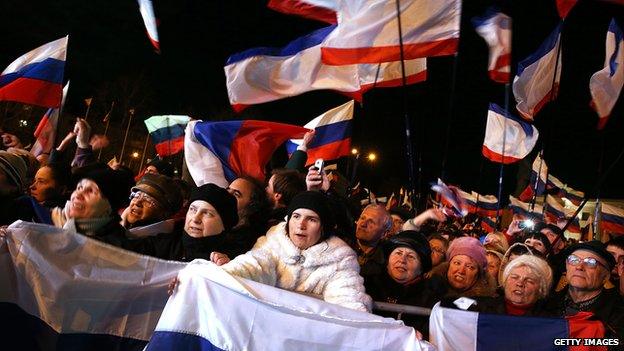Dmitry Kiselyov: Russia's chief spin doctor
- Published
Presenter Dmitry Kiselev condemns US over Ukraine on his show Vesti Nedeli
Russian state TV presenter Dmitry Kiselyov has a reputation for extravagant tirades demonising the West, stigmatising homosexuals and portraying Ukraine as a country overrun by violent fascists.
He also has the unusual distinction, for a journalist, of being targeted by EU sanctions - imposed in the wake of Russia's annexation of Crimea.
Mr Kiselyov delivered another of his anti-Western diatribes in the 30 March edition of Vesti Nedeli (News of the Week), his flagship current affairs show on the official channel Rossiya 1.
Millions of Russians rely on the main state-owned TV channels for their news.
'Radioactive ash'
With dainty, almost balletic hand gestures and the faint trace of an ironic smile on his lips, Kiselyov asks with mock concern "what's up" with Barack Obama. The US president's ratings, he says, are on the slide, while Russian President Vladimir Putin's continue to rise.
Turning to another camera, he goes on to denounce the US for trying to spread revolution with "terrorists" in Syria and "fascists" in Ukraine. "They shamelessly spy on everyone, wanting to control the world, but they suffer one defeat after another," he concludes.
It was a typical Kiselyov performance, if not quite a vintage one. Two weeks earlier, he had mocked what he said were President Obama's waning powers, as symbolised by his greying hair, before boasting that Russia was the only country "genuinely capable of turning the USA into radioactive ash".
At the beginning of March, he had lambasted Ukraine as a country overrun by "bandits", where democracy was "on its knees". He sneered at the weakness of the Ukrainian army and airily dismissed the idea of Western sanctions. He also said the fate of Crimea was a "personal matter" for each and every Russian citizen.
Mr Kiselyov's polemic set the tone for the Kremlin's policy on Ukraine that culminated in Mr Putin's triumphant annexation of Crimea some three weeks later.

Pro-Russian protesters in Simferopol, Crimea - the majority of people on the peninsula speak Russian
'Authoritative' figure
Mr Kiselyov is a key part of Mr Putin's media operation. Apart from his role as TV anchor, he was recently appointed to head the new Russia Today , externalnews agency, whose mission is to further beef up the Kremlin's media presence around the world.
The appointment was controversial, not least because of Mr Kiselyov's repeated attacks on homosexuals. The most notorious of these came on a Rossiya 1 talkshow in 2012, when he said gay people should be banned from donating blood and sperm, and that if they were killed in a car crash "their hearts should be buried in the ground or burnt as unfit for helping to prolong anyone's life".
A blog, external published by The Economist has dubbed Mr Kiselyov Russia's "chief propagandist".
According to former Kremlin insider and political analyst Gleb Pavlovskiy, external, Kiselyov and his state media colleagues are generators of "Russophobia". They are a "machine churning out the black myth of Russia as an enemy of Europe and civilisation", Mr Pavlovskiy said.
The Ukrainian authorities have now ordered all cable operators to suspend broadcasts of Rossiya 1 and three of Russia's other state-controlled channels. Russian TV has been widely watched in Russian-speaking parts of Ukraine, and now dominates the airwaves in Crimea.
Mr Kiselyov himself is now the subject of a travel ban and asset freeze by the EU.
But at home he appears to be riding high. A recent poll, external by the Public Opinion Foundation (FOM) named him as Russia's second most respected and authoritative journalist. Another FOM poll, external found that more than 50% of respondents thought it acceptable to "distort information" in the interests of the state.
BBC Monitoring, external reports and analyses news from TV, radio, web and print media around the world. For more reports from BBC Monitoring, click here